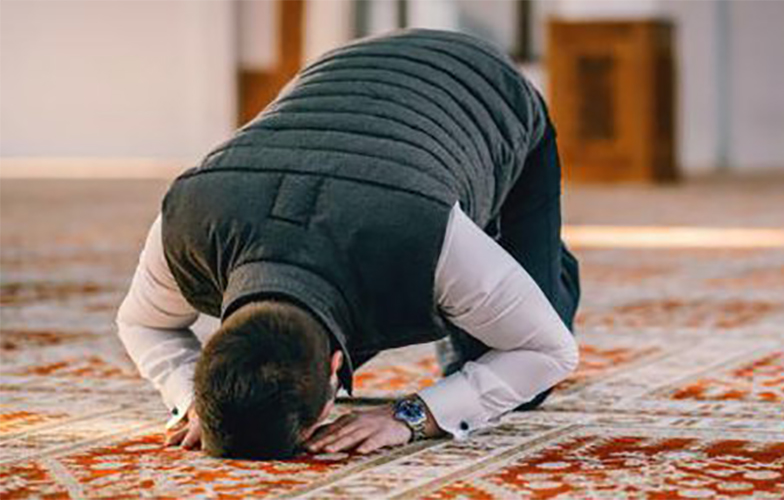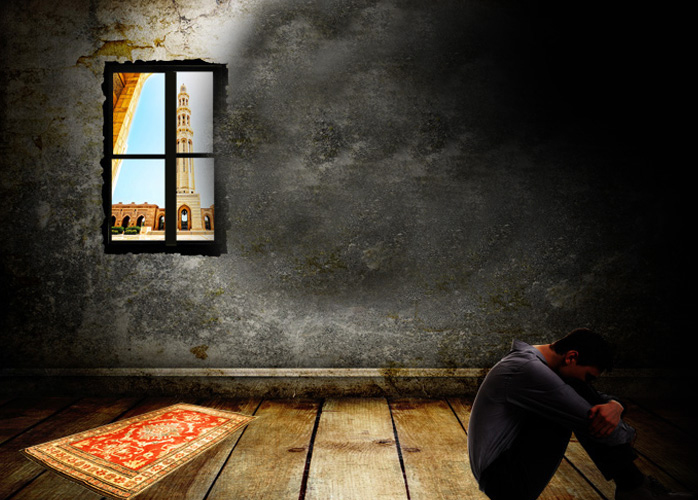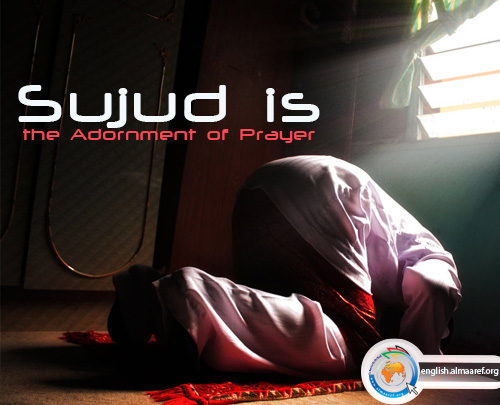The Verses Prayer
The verses prayer is dutiful when one of the following events takes place1:
1- the solar eclipse, even in case it is a partial one
2- the lunar eclipse, also even in case it is a partial one
3- the earthquake
4- any event that is scared by the majority of people like the black wind or the
collapse
The How of the Verses Prayer
The verses prayer is made up of two bows in which one performs bowing five
times and prostrates twice. It has two forms.
* First Form
1- Intention
2- Saying, “God Is Great”
3- Bowing five times after having read, before each time, Al-Fatihah [The
Opening] Chapter in addition to any other chapter
4- Prostrating
Having done with the first bow, one must stand up to perform the second bow
exactly like the first one then:
5- bear witness
6- bestow peace
* Second Form
It is like the first one except for that one must read before the first
bowing Al-Fatihah in addition to one verse only from another chapter, read a
part of this another chapter without Al-Fatihah before every bowing, and so on
till he finishes it before the fifth bowing. Therefore, Al-Fatihah is read once
a bow. In the second bow, one must do the same he did in the first bow, bear
witness, and then bestow peace.
Time of Performing the Verse Prayer
1- The prayer of the solar eclipse must be performed since the beginning of
the event till the start of its retreat. In case one delays the performance, he
has to perform it with the intention of the absolute getting close to The Most
High God.2
2- The prayer of the earthquake and the other events must be performed
immediately when one is able to. In case one delays the performance, he has to
perform it with the intention of the absolute getting close to The Most High
God.3
The Judgments of the Verses Prayer
1- The verses prayer must be performed as many as the events imposing it
are. 4
2- It is desirable to perform it in group and to raise the voice in recitation.5
3- The verses prayer is dutiful only on the one who is in the place where the
event takes place and in the place which is related to it.6
4- The judgments and conditions (i.e. purity, permissibility, etc) which are
applied to the daily duties are also applied here.
5- There are several cases with respect to the one who does not know about the
event till after it has finished:
A- In case it is an earthquake or any other scaring event, there are two cases:
First: that he knows about it in the time directly related to the time of
the event; then, he has to perform it.
Second: that he knows about it after the time directly related to the
time of the event; then, it is not dutiful on him to perform it even though it
is a desirable cautiousness to do so.
B- In case it is a solar or a lunar eclipse, there are two cases:
First: that the eclipse is partial; then, nothing is imposed on the
religiously responsible person.
Second: that the eclipse is complete; then, he has to perform the verses
prayer as a clearance.
The Clearance Prayer
The Dutifulness of Clearance
- It is dutiful to clear the missed daily prayer whether missed
intentionally, unintentionally, or ignorantly. It is not dutiful on the boy to
clear what he missed before reaching the age of being assigned with the
religious responsibility. Neither does the insane person or the person who
fainted in case the fainting is unintentional.7
- It is dutiful on the sleeper to clear the prayers he missed during his sleep.
Also, it is dutiful on the person who fainted to clear the prayers he missed
during the faintness in case fainting is intentional as a dutiful cautiousness.8
- In case the boy reaches puberty or the insane or the fainted person wakes up
with no time remaining but what suffices for even one bow only with performing
the ablution with clean sand or earth, then he has to perform it in its stated
time; otherwise, he must clear the prayer.9
- It is dutiful to clear all the prayers performed while being in the great
ritual impurity or any impurity even if ignorantly (as happens at the beginning
of puberty), or the prayers performed with an abolished washing or ablution.10
The Time of Clearance
- Immediacy is not dutiful as regards clearance. Clearance is a broad duty
extending as long as lifetime is unless it is not performed due to negligence or
leniency in the performance of the religious responsibility.11
- It is permissible to clear the duties at any time whether in the night, during
the day, in the travel, or in the home. One must completely perform the duties
which he missed in the home, and he must in the home shorten the duties which he
missed in the travel i.e. he must clear the missed duties as they were missed.12
- In case one is in the home at the beginning of the stated time yet is in
travel at the end of the stated time or vice versa, then one must work on the
basis of where he is at the end of the stated time.13
- The supererogatory prayers and the desirable ones are not considered to be a
clearance for the missed prayers.14
- In case one knows that he has to clear one of the daily prayers without a
specification of this prayer, it settles for him to perform a morning prayer, a
sunset prayer, and four bows with the intention of clearing what he missed.15
- In case the religiously responsible person knows that he missed several
prayers yet is not sure of how many they are, he is then permitted to perform as
many prayers as he assumes. For instance, in case he doubts that the missed
prayers are either ten or fifteen, he is permitted in this case to be satisfied
with ten prayers even if it is a desirable cautiousness to perform the other
five prayers.16
- It is not dutiful to perform the clearance prayer before the duty. Still, it
is a desirable cautiousness to perform the missed prayer before the duty of the
same day; for instance, it is a desirable cautiousness to perform the morning
prayer before the noon prayer of the same day.17
The How of Clearance
In case there are several missed prayers, it is a desirable cautiousness to
perform the previous ones before the later ones. As regards the prayers which
religiously demand considering the order in their performance like the noon and
the afternoon prayers, and the sunset and the evening prayers, then it is
dutiful to perform them orderly.18
There are two methods to clear the missed prayers. The first one is to clear the
prayers of a whole day as is the case with daily prayers.19 The
second one is to perform several ones from a certain prayer and then perform the
next duty thus taking in consideration the order we referred to as regards the
noon and the afternoon prayers, and the sunset and evening prayers.20
1- Ajweebat Al-Istifta’at
[The Answers to the Consultations] / Part One/ Page 207/ Question 710
2- Tahreer Al-Waseela [Editing the Means] / Part One/ Page 192/ Question 3
3- Tahreer Al-Waseela/ Part One/ Page 192/ Question 3
4- Ajweebat Al-Istifta’at [The Answers to the Consultations] / Part One/ Page
208/ Question 714
5- Tahreer Al-Waseela/ Part One/ Page 194/ Questions 11 and 12
6- Ajweebat Al-Istifta’at/ Part One/ Page 208/ Question 712
7- Tahreer Al-Waseela/ Part One/ Page 223
8- Tahreer Al-Waseela/ Part One/ Page 223
9- Tahreer Al-Waseela/ Part One/ Page 222/ Question 1
10- Ajweebat Al-Istifta’at/ Part One/ Page 150/ Questions 523, 524, and 527
11- Tahreer Al-Waseela [Editing the Means] / Part One/ Page 223
12- Tahreer Al-Waseela/ Part One/ Page 224/ Question 5
13- Tahreer Al-Waseela/ Part One/ Page 224/ Question 5
14- Tahreer Al-Waseela/ Part One/ Page 525
15- Tahreer Al-Waseela/ Part One/ Page 225/ Question 9
16- Tahreer Al-Waseela/ Part One/ Page 226/ Question 10
17- Tahreer Al-Waseela/ Part One/ Page 227/ Question 13
18- Tahreer Al-Waseela [Editing the Means]/ Part One/ Page 225/ Question 8
19- Ajweebat Al-Istifta’at [The Answers to the Consultations]/ Part One/ Page
151/ Question 529
20- Ajweebat Al-Istifta’at / Part One/ Page 151/ Question 530




















